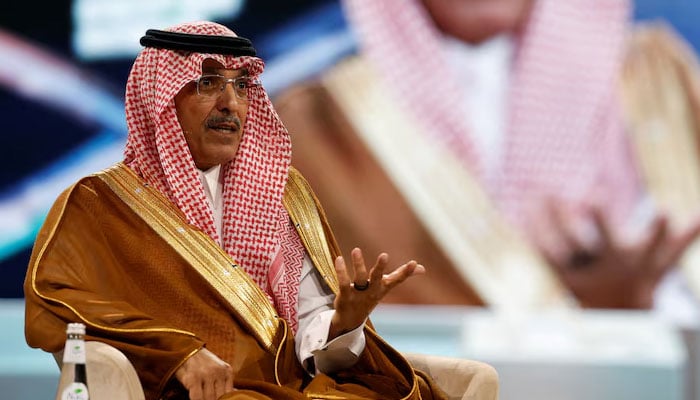Saudi Arabia pushes ahead with economic transformation, minister says
RIYADH: Saudi Arabia is “doubling down” on its multi-billion dollar plan to overhaul its economy and cut the kingdom’s dependence on oil rents, the finance minister told an investor summit in Riyadh on Wednesday.
The government is investing heavily in infrastructure works such as the vast mega-city NEOM project under the plan driven by Crown Prince Mohammed bin Salman, who wants to grow the private sector, develop new industries and create thousands of jobs.
“Overall, we are very, very excited and happy with what we have achieved with Saudi Vision 2030 but we are not complacent. We are doubling down, making sure we are doing the right thing,” Finance Minister Mohammed Al Jadaan told the Future Investment Initiative (FII) event, saying the initiative was largely on track.
The country’s $925 billion PIF sovereign wealth fund, tasked with delivering much of the transformation, has made its mark on the global stage in recent years with high-profile deals, such as investments in Uber.
But its governor told the FII on Tuesday the PIF now plans to reduce the share of its overseas investments by about a third as it focuses on domestic projects.
Foreign direct investment (FDI), which had stalled in recent years, is key for driving the massive economic transformation.
The government has a target of attracting $100 billion in FDI by 2030, equivalent to almost 6.0 per cent of its GDP. FDI is on an upward trend, but with five years to go, data indicates that the kingdom could struggle to meet the target by 2030.
Oil is still a mainstay of the economy and amid lower oil prices and production, government earnings have fallen and the kingdom is reviewing spending, under which some Vision 2030 projects will be delayed or scaled back, and others prioritised.
Jadaan told the conference human resources and implementation had been a challenge for some of the economic transformation targets, but said non-oil GDP now represented about 52 per cent of the economy.
INVESTMENT PLEDGES
The FII, now in its eighth year, has become a major gathering of the world’s financial titans.
Former US Treasury Secretary Steve Mnuchin was among the speakers on Wednesday. Several Republicans and former officials of Donald Trump’s administration are attending the annual summit that ends on Thursday.
Saudi Arabia’s sovereign wealth fund the PIF announced that it would be an anchor investor in Brookfield’s new $2 billion Middle East-focused private equity fund, while PIF-owned Riyadh Air said that it was ordering 60 Airbus A321 narrow-body jets.
The head of Saudi Arabia’s mining giant Ma’aden told Reuters Saudi Arabia was in the advanced talks for a stake in a Zambian copper mine and expects a deal this year.
The kingdom’s growing mining industry is a key part of the Vision 2030 plan to diversify the economy.
While not on the formal agenda, the conflict in Israel, Gaza and Lebanon shaped many of the discussions at the FII, with investors concerned about the impact on regional investments. Jadaan acknowledged the conflict but said Saudi Arabia was a stable place to invest. “This is one of the brightest spots in the world in terms of what investors look for,” he said.
-
 Selma Blair Explains Why Multiple Sclerosis 'isn't So Scary'
Selma Blair Explains Why Multiple Sclerosis 'isn't So Scary' -
 Will Smith Surprises Wife Jada Pinkett With Unusual Gift On Valentine's Day
Will Smith Surprises Wife Jada Pinkett With Unusual Gift On Valentine's Day -
 Shamed Andrew Has Paid Royal Favours With ‘national Scandal’
Shamed Andrew Has Paid Royal Favours With ‘national Scandal’ -
 Prince William Ticked Off By How Andrew ‘behaved With Staff’
Prince William Ticked Off By How Andrew ‘behaved With Staff’ -
 Prince William Questions Himself ‘what’s The Point’ After Saudi Trip
Prince William Questions Himself ‘what’s The Point’ After Saudi Trip -
 James Van Der Beek's Friends Helped Fund Ranch Purchase Before His Death At 48
James Van Der Beek's Friends Helped Fund Ranch Purchase Before His Death At 48 -
 King Charles ‘very Much’ Wants Andrew To Testify At US Congress
King Charles ‘very Much’ Wants Andrew To Testify At US Congress -
 Rosie O’Donnell Secretly Returned To US To Test Safety
Rosie O’Donnell Secretly Returned To US To Test Safety -
 Meghan Markle, Prince Harry Spotted On Date Night On Valentine’s Day
Meghan Markle, Prince Harry Spotted On Date Night On Valentine’s Day -
 King Charles Butler Spills Valentine’s Day Dinner Blunders
King Charles Butler Spills Valentine’s Day Dinner Blunders -
 Brooklyn Beckham Hits Back At Gordon Ramsay With Subtle Move Over Remark On His Personal Life
Brooklyn Beckham Hits Back At Gordon Ramsay With Subtle Move Over Remark On His Personal Life -
 Meghan Markle Showcases Princess Lilibet Face On Valentine’s Day
Meghan Markle Showcases Princess Lilibet Face On Valentine’s Day -
 Harry Styles Opens Up About Isolation After One Direction Split
Harry Styles Opens Up About Isolation After One Direction Split -
 Shamed Andrew Was ‘face To Face’ With Epstein Files, Mocked For Lying
Shamed Andrew Was ‘face To Face’ With Epstein Files, Mocked For Lying -
 Kanye West Projected To Explode Music Charts With 'Bully' After He Apologized Over Antisemitism
Kanye West Projected To Explode Music Charts With 'Bully' After He Apologized Over Antisemitism -
 Leighton Meester Reflects On How Valentine’s Day Feels Like Now
Leighton Meester Reflects On How Valentine’s Day Feels Like Now




